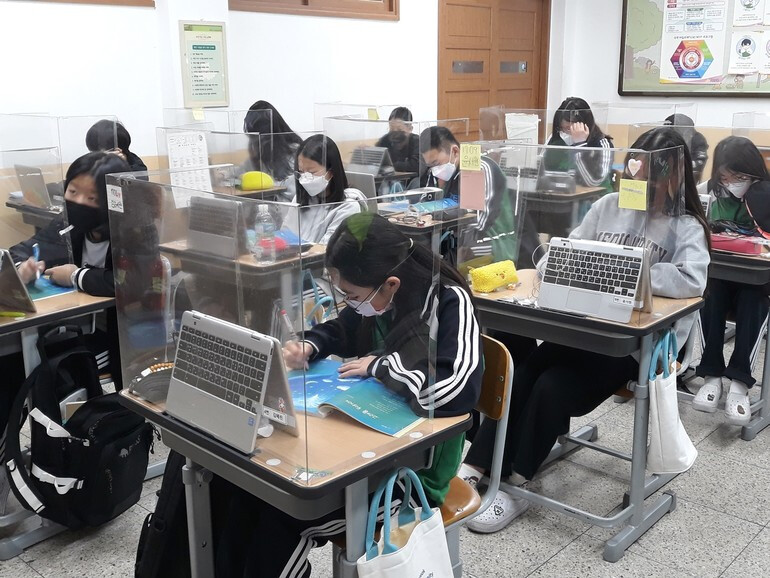
[GLOBAL ECONOMIC TIMES] The budget paid by metropolitan and provincial offices of education across the country to the Swiss IB headquarters for International Baccalaureate (IB) education until this year was found to be about 2.4 billion won. However, excluding the Daegu Metropolitan Office of Education, less than 10% of schools were certified as IB schools. It is pointed out that as a significant amount of budget continues to be invested while IB education is not properly established, the budget for general classes is relatively decreasing.
According to the IB education budget data received from metropolitan and provincial offices of education across the country by the office of Kang Kyung-sook, a member of the National Assembly's Education Committee, of the Democratic Party of Korea, on the 27th, eight metropolitan and provincial offices of education (Gyeonggi, Daegu, Busan, Seoul, Jeonnam, Jeonbuk, Jeju, and South Chungcheong) received The budget paid to the IB headquarters for annual membership fees and other expenses until this year was calculated to be 2,411.17 million won. The total estimated budget to be invested in IB education over the five years from next year to 2029 by these eight places and the Gyeongbuk, Incheon, and Chungbuk Provincial Offices of Education amounted to 18,180.62 million won.
The IB program was introduced in Korea as an alternative to cramming education. We conduct inquiry-oriented classes focusing on discussions and presentations, and evaluate students through arguments and oral statements. In the early days of introduction, the IB program was operated mainly in international schools, special purpose high schools, and private high schools. In 2019, the Daegu Metropolitan Office of Education and the Jeju Provincial Office of Education introduced it to public education for the first time, and as the introduction of IB in public education became a hot topic in the 2022 national metropolitan and provincial education superintendent elections, it spread to other metropolitan and provincial offices of education. Currently, the IB program is being operated in regions excluding Gangwon, Gyeongnam, Gwangju, Daejeon, Ulsan, and Incheon.
In order to introduce and operate the IB program, expenses such as candidate school application fees, annual membership fees, and consulting fees must be paid to the IB headquarters, a non-profit international educational organization established in Geneva, Switzerland. Schools wishing to introduce the IB program receive approval from the IB headquarters in three stages: school of interest → candidate school → certified school. In the case of elementary and middle schools, they can be officially operated as IB schools even if they are certified as candidate schools, but high schools must be certified as certified schools to be recognized as IB schools.
As of this year, the number of IB schools (including basic, interested, candidate, and certified schools) in 9 regions (Gyeonggi, Gyeongbuk, Busan, Seoul, Jeonnam, Jeonbuk, Jeju, South Chungcheong, and North Chungcheong) excluding Daegu is elementary, middle, and high schools in each region. It was less than 10% of high school students. Even in the Gyeonggi region, which was relatively active in introducing IB education, only 4.96% of elementary schools, 9.83% of middle schools, and 7.6% of high schools were operating IB schools. The ratio of IB schools to the number of elementary, middle, and high schools by region was 1.09% in Gyeongbuk, 1.62% in Busan, 6% in Seoul, 0.97% in Jeonnam, 4.06% in Jeonbuk, 6.88% in Jeju, 2.51% in South Chungcheong, and 1.93% in North Chungcheong. Daegu was 22%.
Among the nine regions, only Gyeonggi (1 high school) and Jeju (5 elementary schools, 2 middle schools, and 1 high school) have certified schools. Daegu operates 10 elementary schools, 11 middle schools, and 5 high schools as IB certified schools.
Among regions that have introduced the IB program, there are some places where IB schools are concentrated in specific school levels, causing a problem in the continuity of elementary, middle, and high school education. 34.68% of middle schools in Daegu are IB schools, but elementary schools (17.24%) and high schools (17.02%) account for about half of this. In Seoul and Busan, IB candidate schools and schools of interest exist only in elementary schools and middle schools, but not in high schools. The problem of IB education being disconnected is inevitable due to differences in adoption rates between school levels.
It is analyzed that the relatively low rate of introduction of the IB program in high schools is because it is difficult to link it with the current college entrance system. Students attending IB high schools prepare for university admission through the comprehensive student record screening system that does not require a minimum score on the CSAT. Minister of Education Lee Joo-ho said in a departmental review of non-economic ministries by the National Assembly's Budget and Accounts Special Committee last month, "I agree with the point that we need to find a way to better link with the entrance exam system," and added, "We will work to improve the system step by step."
Rep. Kang said, “There have been expectations and concerns about IB education in the education field since its introduction,” adding, “It is difficult to settle in the field without considering the fact that a large amount of tax money is leaked overseas and the connection with the college entrance system has not been reviewed.” “There is a need for sufficient review and social consensus on this,” he said.
[Copyright (c) Global Economic Times. All Rights Reserved.]






























